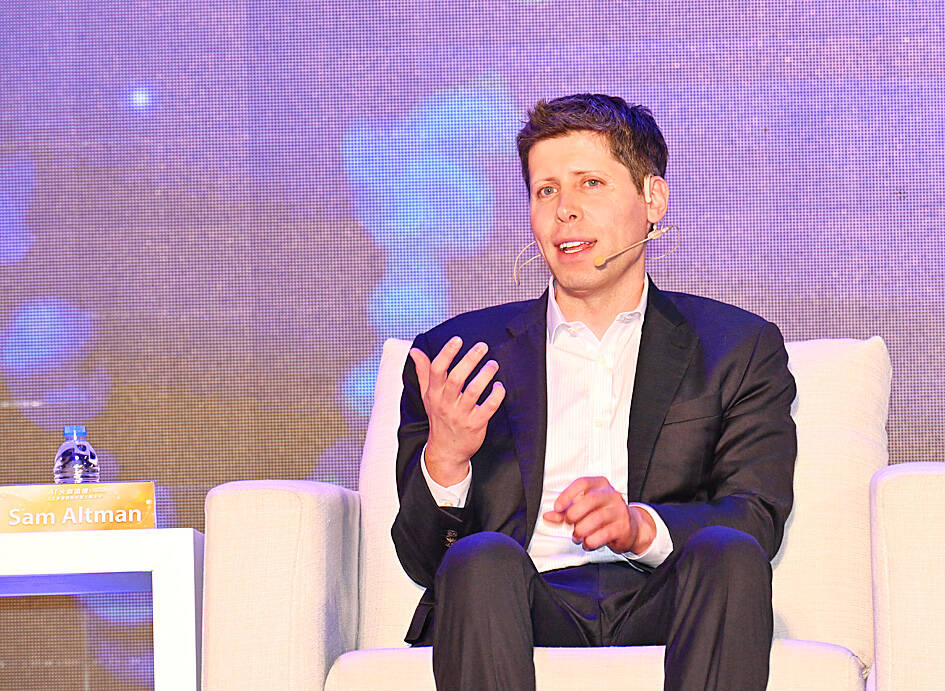ChatGPT creator OpenAI’s CEO yesterday said it was possible to get regulation wrong, but this should not be feared, amid global concerns about rapid advances in artificial intelligence (AI).
Many countries are planning AI regulation, and the UK is hosting a global AI safety summit in November, focusing on understanding the risks posed by the frontier technology and how national and international frameworks could be supported.
Taiwan is drafting an act to govern AI, which would cover the legal definition of AI, privacy protections, data governance, risk controls and related ethical principles, the National Science and Technology Council said in July.

Photo: Tien Yu-hua, Taipei Times
Sam Altman, CEO of Microsoft Corp-backed OpenAI, said during a Taipei visit that although he was not so worried about government over-regulation, it could happen.
“I also worry about under-regulation. People in our industry bash regulation a lot. We have been calling for regulation, but only of the most powerful systems,” he said.
“Models that are like 10,000 times the power of GPT4, models that are like as smart as human civilization, whatever, those probably deserve some regulation,” added Altman, speaking at an AI event hosted by the charitable foundation of Terry Gou (郭台銘), the founder of major Apple Inc supplier Hon Hai Precision Industry Co (鴻海精密), also known as Foxconn Technology Group (富士康科技集團).
Altman said that the tech industry has a “reflexive anti-regulation thing.”
“Regulation has been not a pure good, but it has been good in a lot of ways. I do not want to have to make an opinion about every time I step on an airplane how safe it is going to be, but I trust that they are pretty safe and I think regulation has been a positive good there,” he said.
“It is possible to get regulation wrong, but I don’t think we sit around and fear it. In fact we think some version of it is important,” he said.
Gou, an independent candidate running for Taiwan’s presidency, attended the forum but did not speak at the event.
Additional reporting by CNA

Taiwan’s rapidly aging population is fueling a sharp increase in homes occupied solely by elderly people, a trend that is reshaping the nation’s housing market and social fabric, real-estate brokers said yesterday. About 850,000 residences were occupied by elderly people in the first quarter, including 655,000 that housed only one resident, the Ministry of the Interior said. The figures have nearly doubled from a decade earlier, Great Home Realty Co (大家房屋) said, as people aged 65 and older now make up 20.8 percent of the population. “The so-called silver tsunami represents more than just a demographic shift — it could fundamentally redefine the

The US government on Wednesday sanctioned more than two dozen companies in China, Turkey and the United Arab Emirates, including offshoots of a US chip firm, accusing the businesses of providing illicit support to Iran’s military or proxies. The US Department of Commerce included two subsidiaries of US-based chip distributor Arrow Electronics Inc (艾睿電子) on its so-called entity list published on the federal register for facilitating purchases by Iran’s proxies of US tech. Arrow spokesman John Hourigan said that the subsidiaries have been operating in full compliance with US export control regulations and his company is discussing with the US Bureau of

Businesses across the global semiconductor supply chain are bracing themselves for disruptions from an escalating trade war, after China imposed curbs on rare earth mineral exports and the US responded with additional tariffs and restrictions on software sales to the Asian nation. China’s restrictions, the most targeted move yet to limit supplies of rare earth materials, represent the first major attempt by Beijing to exercise long-arm jurisdiction over foreign companies to target the semiconductor industry, threatening to stall the chips powering the artificial intelligence (AI) boom. They prompted US President Donald Trump on Friday to announce that he would impose an additional

Pegatron Corp (和碩), a key assembler of Apple Inc’s iPhones, on Thursday reported a 12.3 percent year-on-year decline in revenue for last quarter to NT$257.86 billion (US$8.44 billion), but it expects revenue to improve in the second half on traditional holiday demand. The fourth quarter is usually the peak season for its communications products, a company official said on condition of anonymity. As Apple released its new iPhone 17 series early last month, sales in the communications segment rose sequentially last month, the official said. Shipments to Apple have been stable and in line with earlier expectations, they said. Pegatron shipped 2.4 million notebook